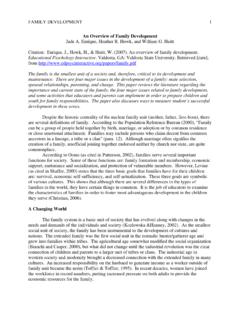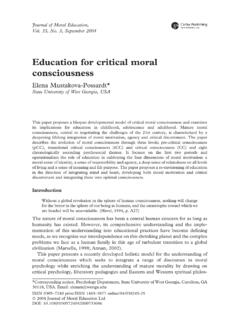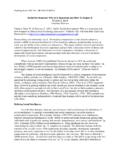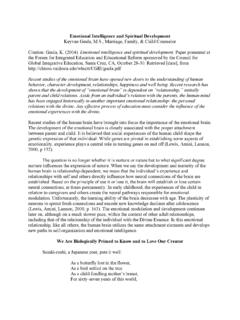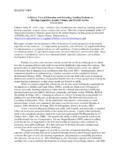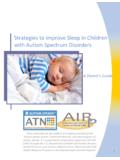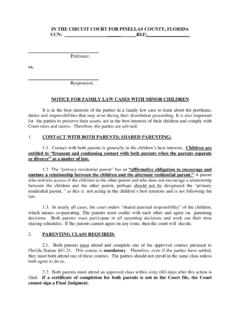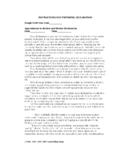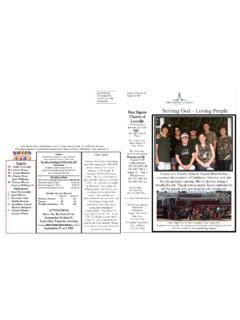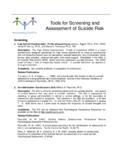Transcription of Military Deployment: Effects on Families and …
1 Running head: Military deployment 1 Military deployment : Effects on Families and children and Implications for Teachers Jessica R. Cobb Valdosta State University December 2009 Military deployment 2 Abstract Literature regarding Military deployment , the deployment cycle, its effect on Military Families and children , and implication and strategies for teachers are examined. deployment is defined as any assignment away from one s home, whether it is overseas or in the states, or during peacetime or wartime. Military Families must deal with specific stressors throughout the both time at home and deployment . children face strong emotional, behavioral, and academic Effects during a parent s deployment . Teachers are a valuable resource in the students coping and should be educated on the Effects of deployment , as well as be prepared to implement strategies for success. Military deployment is an issue that our country faces, but it is one that can be handled appropriately.
2 Military deployment 3 Military deployment : Effects on Families and children and Implications for Teachers Before World War II, our country s Military service constituted of primarily single men. However, since WWII, there has been a demographic shift from the single man s army to the married man s Army, Navy, Air Force, and Marines (Hunter, 1977). At any given time, one could estimate that roughly one-third of the United States population is a veteran, a current service member, or a spouse or dependent of a veteran or service member (Black, Jr., 1993). In 1990, roughly 4 million people were in the active armed services, National Guard, or reserves. These roughly 4 million people had approximately 5 million spouses and dependents. This means that about of the US population was either serving our country, or depending on someone serving our country. Over the last two decades, roughly three-fourths of all active service members and reserve members have children at home, with over million being under the age of 18 (Black, Jr.)
3 , 1993; Robertson, 2008). Roughly half of those children range in age from zero to 5, and more specifically roughly 500,000 under the age of three (Black, Jr., 1993; Robertson, 2008). With over 350,000 of our service members deployed at any given time, and the high number of children affected by the absence of their parents, it is understandable why research shows the usefulness of gaining a better understanding of the Military way of life, deployment , its Effects on family and children , and implications for educators (Robertson, 2008; Hunter, & Nice, 1978). The deployment Cycle In order to support students to the best of our abilities, it is important for teachers to be knowledgeable about exactly what is happening when a parent is deployed. When a service member is deployed, they are temporarily stationed away from home either overseas or somewhere within the United States (Allen, & Staley, 2007).
4 These tours of duty sometimes Military deployment 4 allow family members to relocate with the service member; however, these assignments frequently require loved ones to be separated and live apart from their serving family member (Fagen, Janda, Baker, & Fischer, 1967; Allen, & Staley, 2007). Due to current events, defense commitments, and the ever-changing Military technology, members of the Military are being required more than ever before to attend instructional trainings and extended tours of duty (Baker, Fagan, Fischer, Janda, & Cove, 1967). Even service men and women that are stationed in other countries have to attend trainings or overseas tours (Allen, & Staley). No matter where a family is stationed, either in the United States or abroad, there are millions of children around the world that are currently living with the difficulties of having a parent that is deployed and away from home.
5 Teachers also need to learn about the deployment cycle so that they can better understand the emotional stressors and needs of children at different points during their parent s deployment . The very first stage of the deployment cycle is before the parent ever leaves. This is known as Pre- deployment . Pre- deployment begins as soon as the family is notified of the deployment and is given the deployment schedule (Kim, & Yeary, 2008). This stage can be as long as a few months, or as short as 24 hours (Robertson, 2008). Though the family member is still at home, the family may enter a stage where they already feel loss due to the thought of the deployment (Kim, & Yeary). Family members might alternate their feelings between denial and anticipation, and could exhibit symptoms such as mood swings, lack of organization, forgetfulness, and depression (Robertson; Kim, & Yeary). Depending on the location of the deployment and the duties of the deployment , Families feelings could vary if the family member is entering a war zone or simply going on a training mission (Robertson).
6 During this stage, children specifically need reassurance, open and honest communication, and frequently someone Military deployment 5 to listen to their feelings and concerns. It is important to not give the child too much information, but still make sure that they are informed and involved in process of preparing for the absence. The second stage begins as soon as the family member leaves, and lasts through the first month of the actual deployment (Kim, & Yeary, 2008; Robertson, 2008). During this phase, family members tend to go through a period of grief and mourning as the positive mindset leaves and reality sinks in. Depression becomes more typical and may last for weeks, while others feel a sense of relief, which can lead to guilt, as they move through the stages of the process (Kim, & Yeary). Families are working to establish new methods of communication and routines, and can feel overwhelmed as they try to effectively support and comfort one another (Robertson, 2008).
7 This is the time when children most need a sense of security and predictability in their lives. It is important that their routine stays the same, and they realize that though things are different, they are still loved. children also need their parent at home to stay calm and feel supported so that they can still be there for the coping children as well. The third stage, sustainment, comes when a family finally accepts the deployment , becomes more positive and accustomed to the absence, and establishes a new family routine (Kim, & Yeary, 2008; Robertson, 2008). The family has typically established a form of communication with their loved one by this point, found some sort of support system, and found ways to stay informed about their family member s situation. However, if these routines and supports are not in place, family members might become impulsive and experience heightened stress and depression (Robertson, 2008).
8 The child still needs routine, predictability, and understanding. It is essential that the child be involved in communication with their parent through letters, videos, emails, or any other means necessary. This is a good time for the child to Military deployment 6 learn about positive contribution as a means of fulfilling their need for a sense of accomplishment. The fourth stage can include many things. It is possible that the service member will find out that he or she will not be coming home as soon as expected (Robertson, 2008). This can cause frustration and worry about the family and the family members wellbeing. Alternatively, if the service member finds out they will be coming home at the scheduled time, Families could be excited and anxious as they prepare for their loved one s return (Kim, & Yeary, 2008). This can still be stressful as family members wonder how their loved one has changed and how life will be different upon their return.
9 The level of communication in this stage greatly affects the intensity of emotions during the final parts of separation (Robertson). children may have difficulty controlling their emotions through this stage as they may be upset if the parent has to stay longer than expected, or excited as they prepare for their parent s return. It could make behavior a problem as they seek out ways to express their emotions. As with all the other stages, the emotions of the adults around the children greatly affect the emotions of the child. The fifth and final stage, post- deployment and reunion, is often unpredictable in regards to the emotions of the family (Kim, & Yeary, 2008). There could be a struggle as Families begin to renegotiate family roles and relationships. There is even evidence that this heightened stress could lead to higher risks for child or spouse abuse. Families might go through a honeymoon stage in the beginning that can give way to a feeling of disappointment upon the realization that things are typically never the way they used to be prior to the deployment (Robertson, 2008).
10 The length of the deployment has a strong impact on the length and intensity of this stage as returning service members tend to experience culture shock as they reengage themselves in civilian life after longer tours of duty. children might have a hard time understanding this as Military deployment 7 they are overly excited and need a lot of attention from their returned parent. They have been saving many things to share with their parent, and often need some special alone time with the parent in order to feel loved and appreciated. If handled appropriately, the time post deployment can help strengthen the bonds of the child and the returned parent and a drastic improvement in the child s behaviors will be seen (Baker, Cove, Fagen, Fischer, & Janda, 1968). Throughout all of the stages of the deployment cycle, it is important to understand that the stressors on each individual family are different and might be handled in different ways and different lengths of time.
